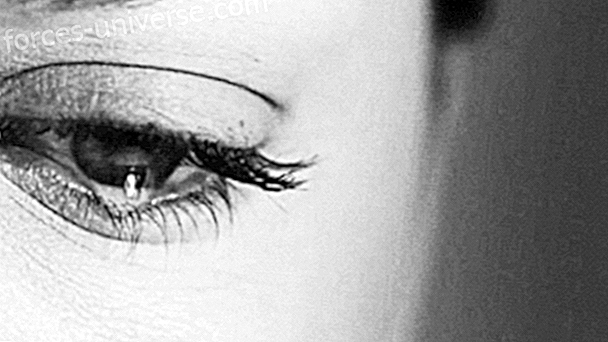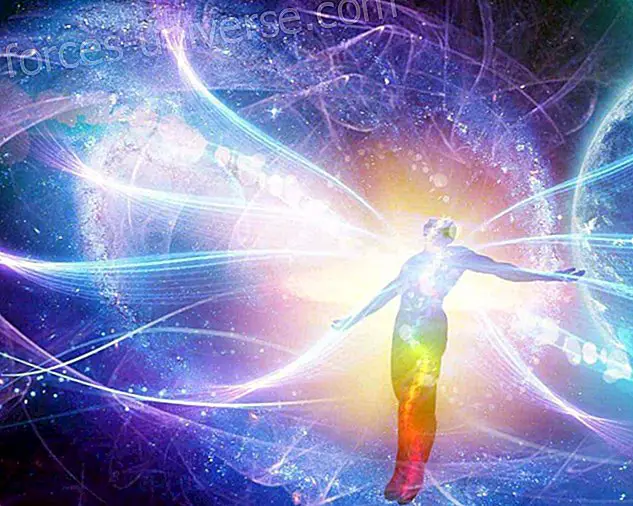 Consciousness and life are different names of the same thing, depending on whether you look inside or outside. There is no life without conscience; There is no consciousness without life. The scientist has investigated the forms, the solution of the problem referring to the character and nature of the energies - focused or located in different forms of the natural or material world - has been considered by the most capable minds in the world of thought. However, the questions what is Life? What is the energy? or what is the process of Being and the nature of Being? They remain unanswered. For pure reason and through the correct functioning of intuition, these problems can be solved and these questions answered. His solution is one of the common revelations and one of the achievements of the visionaries. The only true biologists are those initiated into the mysteries, because they have an understanding of life and its purpose, and are so identified with the principle of life, that they think and speak in terms of energy and its effects. One of those pioneers was Ludwig von Bertalanffy who began his career as a biologist in Vienna in the 1920s. He soon joined a group of scientists and philosophers known internationally as the Vienna Circle and his work included since its inception broad philosophical themes.
Consciousness and life are different names of the same thing, depending on whether you look inside or outside. There is no life without conscience; There is no consciousness without life. The scientist has investigated the forms, the solution of the problem referring to the character and nature of the energies - focused or located in different forms of the natural or material world - has been considered by the most capable minds in the world of thought. However, the questions what is Life? What is the energy? or what is the process of Being and the nature of Being? They remain unanswered. For pure reason and through the correct functioning of intuition, these problems can be solved and these questions answered. His solution is one of the common revelations and one of the achievements of the visionaries. The only true biologists are those initiated into the mysteries, because they have an understanding of life and its purpose, and are so identified with the principle of life, that they think and speak in terms of energy and its effects. One of those pioneers was Ludwig von Bertalanffy who began his career as a biologist in Vienna in the 1920s. He soon joined a group of scientists and philosophers known internationally as the Vienna Circle and his work included since its inception broad philosophical themes.
Today humanity has reached a time of crisis. The mind has reached a functioning power and the personalities are coordinated. At present there are no outstanding characters as in the past, but groups that represent certain ideas. These groups are generally classified into four main sectors: cultural, political, religious and scientific. In more modern times, three other groups have appeared in definite form: philosophical, psychological and financial.
The most modern group of philosophers is powerfully shaping thinking and they have investigated the interesting sensibility of the human being with its three outstanding characteristics, instinct, intellect and intuition, because the nature of the philosophers' theme is reality and the means to acquire knowledge. The other two groups are that of psychologists, who work under the Delphic mandate, "know yourself", and that of the financiers, custodians of the means by which effectiveness is achieved. Thanks to these three groups it has been possible to arrive at a synthesis of what life and consciousness is, shaping a practical phenomenology of the spirit: the entrepreneurial spirit.
The twentieth century left us a new way of thinking. The ideas proposed by organic biologists during the first half of the century contributed to the birth of a new way of thinking: systemic thinking, in terms of connectivity, relationships and context.
Entrepreneurship is a way of thinking, reasoning and acting focused on the opportunities offered by the environment, raised with a global vision and carried out through a balanced leadership and the management of a calculated risk, its result is the creation of value that benefits the company, the economy and society.
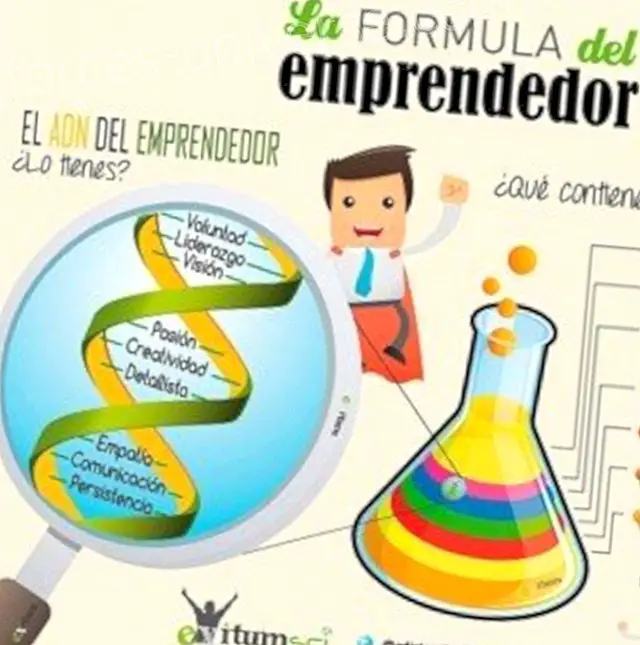 TECHNICAL FUNDAMENTALS.
TECHNICAL FUNDAMENTALS.
THINKING AND LANGUAGE : The main characteristics of systemic thinking emerged simultaneously in various disciplines during the first half of the twentieth century, especially in the twenties. Systemic thinking was led by biologists and subsequently enriched by gestalt psychology and the new science of ecology.
Taking life itself, the whole life in its generality, in all its continuity, as a formative and discriminating test, gives rise to many questions: what is this preparation? Preparation for what? Does it prepare the relationship of identification, of assimilation of the soul to universal and divine reason? Is it about preparing man for the fulfillment of his own life to the decisive and telling point of death? Is it about preparing him for immortality and salvation? To take care of oneself will be to take care as soon as one is a subject of a certain amount of things: subject of instrumental action, subject of relations with the other, subject of behaviors and attitudes in general, subject also of the relationship with himself. But what is the difference between the old precept know yourself and the modern precept know the I ? The self is to the point at which it returns through the extensive process of preparation and the practice of yes. Those relationships that one has with oneself can take the form of acts . For example: we protect the self, we defend the self, we arm it, we equip it. Such relationships can also take the form of attitude relationships: we respect the self, we honor it. And, finally, they can assume, in a way, the form of a state relationship : one owns one, owns his self, makes his own.
Modern man has advanced markedly in the knowledge of himself. Modern literature, and in particular the novel, is an exercise in self-awareness. The human sciences: sociology, psychology, anthropology, linguistics and psychoanalysis, among other disciplines, have set out to clarify the ultimate reasons for human behavior.
CYBERNETICS : as an intellectual movement, it developed independently of organicist biology and general systems theory. Cybernetics is the science that deals with the general principles of management and its application in technique. As a pilot technique, it allows us to see the mind as the communication and control system of the human being: The mind is the ship, the thought is the pilot, the human will is the captain. In this metaphor of navigation, reference is made to the conversion to itself and the return to itself, supporting an ethic of self-control when analyzing its constituent elements:
First, the idea of a journey, an effective displacement from one point to another. Second, this displacement implies that it is directed towards a goal, which has a goal: the port, the safe place where everything is sheltered. Third, the port is the place of mooring, in it we find our place of origin, our homeland, the journey to itself will always have some odyssey. Fourth, the journey itself is dangerous and throughout its journey you face unforeseen risks that may compromise the itinerary and even get lost. Fifth, to finish well and reach the port, knowledge, technique, art is required. Know complex, both theoretical and practical; conjectural knowledge and knowledge very close to piloting.
THE COGNITIVE SCIENCE : The computer model of mental activity became the predominant vision of cognitive science and dominated all brain research during the next thirty years.
Information technologies and especially cybernetics contributed significantly to the relationship between intelligence and information processing by using words such as "memory" and "language" to describe computers, which has generated a misunderstanding by reinforcing the Image of human beings as machines. Recent developments in cognitive science have made it clear that human intelligence is radically different from artificial intelligence. The human nervous system processes information by interacting with the environment through a constant modulation of its structure. Intelligence, memory and human decisions are not entirely rational but are influenced by emotions, even better, by feelings.
The ability to learn, memory and the differentiated response to the environment, is the provision of the mind. The mind can take advantage of experience, can learn from the reactive habits of behavior in response to the repetition of stimuli. For this, the apprentices must learn to control and regulate their cognitive processes, as well as get used to reflecting on their own behavior, that is, to exercise the meta-knowledge. That awareness that allows us to modify what we know and what we do should be promoted. But that awareness can only be obtained from instruction, it must be the teachers who, becoming aware of their task, end up transferring their knowledge and control to the learners.
By exercising metacognition, higher-level intellectual competencies are enhanced: problem solving, creativity and decision making. Performance improves when the learner feels committed to the task to be done and this commitment becomes even more evident when he is allowed to select his goals and participate actively in making decisions about his learning. In the case of creativity, the applicant is required to take responsibility, make a deliberate effort to improve his intellectual performance, propose ever higher levels of demand and try to understand the reason and meaning of his effort.
The metacognition is about making a transition from adaptive learning to meaningful learning. Something similar happened with Christian metanoia: a conversion, a passage from one type of being to another, from death to life, from the kingdom of the devil to the kingdom of God, from darkness to light.
CREATIVITY : According to the theory of living systems, the mind is not a thing but a process: the process of life itself. In other words, the organizing activity of living systems, at all levels of life, is a mental activity. Any mental form is considered as a subjective and existing entity, covered with subtle matter and capable of manifesting. It is what is commonly called "developing an idea" or "carrying out a project." Sometimes it reaches the level of "discovery" or "invention", implying how everything that is thought comes into existence. Two concepts are key to the self-organizing capacity of the mind: autopoiesis and ethopoiesis.
Autopoiesis is the ability to create oneself. Autopoiesis is the pattern of organization of living systems. Cognition, the life process, is directly related to autopoiesis, creativity.
The mind-helping spirits come into play in the life-cognition relationship. They are auxiliary to the lower levels of the experiential mind, and can be described, in the order of evolutionary achievements, as follows:
Intuition - rapid perception, primitive physical instincts and inherent reflexes, the directional endowment and other self-preservation of all mental creations; the only one of the assistants who acts so widely in the lower orders of animal life and the only one who puts himself in broad functional contact with the unteachable levels of the mechanical mind.
Understanding - the impulse for coordination, the spontaneous and seemingly automatic association of ideas. This is the gift of coordination of acquired knowledge, the phenomenon of rapid reasoning, rapid judgment and prompt decision.
Courage - the endowment of fidelity - in personal beings, the basis of the acquisition of character and the intellectual root of moral fiber and spiritual fearlessness. Being enlightened by the facts, and inspired by the truth, it becomes the secret of the impulse of evolutionary ascension through the channels of intelligent and conscious self-direction.
Knowledge - The curiosity that is the mother of adventure and discovery, the scientific spirit; the faithful guide and associate of courage and advice; the impulse to direct the endowments of value towards useful and progressive growth paths.
The advice the social impulse, the endowment of cooperation in the species; the ability of volitional creatures to harmonize with their peers, the origin of the gregarious instinct among the lowest creatures.
Worship the religious impulse, the first differential impulse that separates the creatures of mind into the two basic classes of mortal existence. The spirit of worship eternally distinguishes the animal with its associated from creatures of mental endowment without soul. Worship is the badge of the candidacy for spiritual ascent.
The wisdom the inherent tendency of all moral creatures towards orderly and progressive evolutionary advancement. This is the highest of the assistants, the coordinating and articulating spirit of the task of all others.
Ethopoiesis, on the other hand, is that which has the quality of transforming the way of being of an individual. Listening and speaking, reading, writing, are the four skills that give human beings permanent support for subjectivity and creativity. Listening is the procedure by which the truth perceived, heard and collected accordingly, sinks into the subject, becomes embedded in it and begins to become part of itself to build the matrix of ethos. The passage of speech to the act begins of course with listening. Reading and writing constitute a whole activity of self-care and care of others of great importance. Reading, writing and calculation curiously symbolize the total evolutionary development of the breed. Reading takes ideas in ways and is related to the first step of the creative process. The writing symbolizes the method by which the process is carried out but is more personal in its implications. The arithmetic calculation concerns the production of the forms that will adequately generate the idea and take it to its realization.
THE HERMENEUTICS : finally we find in the hermeneutics a method of interpretation of meanings, which when applied to pedagogy, facilitates the interpretation of human actions. A semiological hermeneutic leads us to the interpretation of the I, to achieve this the symbolic zones produced by the subjects in their life history are interpreted. Dreams, rites, metaphors allow us to identify the true essence of the subject, the archetypes that shape his soul as the plot of life.
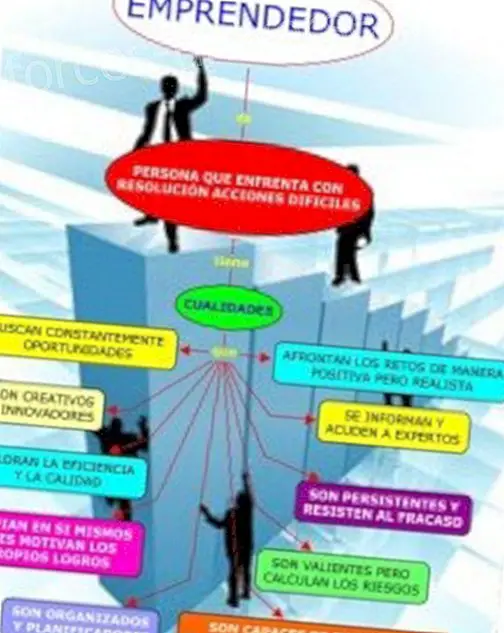 REQUIREMENTS TO BE AN ENTREPRENEUR:
REQUIREMENTS TO BE AN ENTREPRENEUR:
Restlessness by itself presents itself as a general attitude, a certain way of considering things, of being in the world, of carrying out actions, of having relations with others. It also implies a series of actions that are exercised on itself, actions for which it takes care of itself, is modified, purified, transformed and transfigured. Entrepreneurship requires a series of practices that take the form of I technologies: meditation techniques, memorization techniques of the past, awareness examination techniques, verification techniques of representations as they are presented to the mind. These technologies, named by Michel Foucault, are considered by Peter Senge as disciplines, understood as a discipline as the path of development to acquire certain skills or competencies. Thus we would be making an innovation in learning, in human behavior.
1. Character formation, first and essential requirement.
The entrepreneur must learn to evaluate his environment, to identify the opportunities and threats he offers to counter them with his strengths and weaknesses. The day comes when the soul awakens to the need to dominate the situations and affirm its own authority, then it makes an inventory of the situation. You must first discover what kind of strengths you have and what is the motivating force of your daily experience. Having discovered it, he begins to reorganize, reorient and rebuild his personality. All this teaching has been summed up in two words: Vice and virtue, words that synthesize the attitude of man towards himself and his social relations with God and his fellow men.
Virtue is the expression in the man of the spirit of collaboration towards his brothers, in an altruistic, comprehensive way and with total forgetfulness of himself. Vice is the denial of that attitude. Both words simply mean perfection and imperfection, conformity with the divine norm of brotherhood or the failure to reach such a norm. The norms are very variable and change according to how man progresses toward divinity. They vary according to the destiny of man to be affected by his time and according to the stage of evolutionary development and time, nature and environment. The norm to reach the goal is not the same as a thousand years ago or the one that will be within a thousand.
STRENGTHS Use them! | OPPORTUNITIES Take advantage! |
WEAKNESSES Eliminate them! | THREATS Avoid them! |
2. The psychological study of motivation.
The question asked here by the entrepreneur and that only he has the right to answer is: What is the motive that governs my aspiration and effort? Why do I try to build on a true basis? Why do I invoke my soul so diligently?
The development of the right mobile is a progressive effort; we continually change the focus of our incentive as we discover ourselves, then the Light shines more firmly on our path and a new and superior motive constantly emerges.
Motivation is an inner tension that is resolved and calmed by action and in that sense is a source of action. The motivation puts the individual in a state of tension to take him to the corresponding action, to the satisfaction of a need or desire. There have been three behavior patterns that most affect motivation: achievement, affiliation, power.
The need for affiliation predominates in those people concerned about having positively friendly, cordial and affectionate relationships with others. This kind of affiliate interest can be identified as sensitivity and social ability.
The need for achievement predominates in those people who are basically concerned with achieving defined and important objectives, creatively achieved successfully and effectively. This interest class can also be identified as a productive and entrepreneurial capacity for accomplishment. A person with a high motivation for achievement prefers situations in which one has to assume personal responsibility to find solutions to specific problems, with a sense of excellence. It sets moderate achievement goals and takes calculated risks, with an intimate sense of challenge. It values a timely evaluation and concrete information about its own behavior, as a systematic feedback.
3. The service.
Service is generally interpreted as very desirable, but it is seldom understood how difficult it is to serve. It implies sacrificing time, everything that interests us and our own ideas; it requires excessively hard work, because it needs a deliberate effort, conscious wisdom and ability to work without attachment. These qualities are not easily achieved by the common aspirant; However, the tendency to serve is an attitude that today has a vast majority of people in the world.
4. The meditation.
Meditation means the attempt to think with particular intensity of something, without deepening its meaning or, letting thought unfold in a more or less regulated order from the seed on which it is thought. But reading also plays an important role in meditation. It is about appropriating a thought, convincing yourself of it so deeply that, on the one hand, we believe it to be true, and on the other hand we can repeat it incessantly, repeat it as soon as the need arises or the occasion arises. It is about acting in such a way that this truth is recorded in the mind in order to be able to remember it and immediately turn it into a principle of action.
5. The technical study of management science.
Management is understood as the generation of resources from their own. The management includes the identification of each of the activities that are carried out in a process, project or work area. This has resulted in defining the management areas as the set of activities or group of activities that contribute to the achievement of the objectives of an organization. In the case of the human organism, these areas of management are the endocrine glands. The glandular system through hormones, affects all parts of the physical organism through the bloodstream . The orderly and efficient functioning of a multicellular and complex organism, such as that of the human being, requires that the various parties act in concert. The nervous, endocrine and immunological systems function as the body's main controls. The nervous system controls body activity by increasing or decreasing the secretion of many of the body's hormones, these hormones, in turn, regulate many, but most of the body's metabolic functions. A human being can learn a lot from the functioning of the organism, the management indicators are related to the activity of the management areas: their hormones.
GLANDS | HORMONES | INDICATORS |
Pineal | Melatonin | It affects the weakness. |
Hypophysis | Oxytocin | Stimulates growth. |
Thyroid | Thyroxine | It lowers the level of calcium in the blood |
Scam | Thymosin | Increase the production of white blood cells. |
Pancreas | Insulin | Lower blood sugar level. |
Gonads | Testosterone | It affects the development of sexual characters |
Adrenal | Adrenalin | Prepare the body to fight or flee. |
6. Learning the technique of planning.
Learn to apply the will by developing the firm purpose and organization of daily life so that this purpose can be fulfilled. Only when the human being submits to the discipline of his own will, controls the activity of his mental forms and is oriented towards the goal, as he progressively calls for his vision, will he come to a true understanding of his life project . So the order in planning is Vision-Mission-Objectives-Strategies-Goals. Thus there will be coherence between goals and indicators.
Moral will embraces decisions based on reasoned knowledge, augmented by wisdom and sanctioned by religious faith. You have to start by organizing knowledge in ideas-decisions; then, exhort wisdom to work tirelessly on the task of transforming self-taught ideas into increasingly practical ideals. The coordination of ideas-decisions, logical ideals and divine truth constitutes the possession of a straight character, the prerequisite for the admission of the human being to the spiritual levels.
7. The technical study of cash flow: accounting and finance.
Understanding the concepts of accounting in terms of flow and balance, must-have, income-expenses, assets-liabilities, sources-uses, will facilitate us to apply such knowledge in the examination of conscience, awareness that follows the principles of double game. The dusk test responds to the morning test as a general balance, actual balance of the action that had been scheduled or considered in the morning. It is a test of reactivation of the fundamental rules of the action, reactivation of the aims that we must keep in mind, reactivation of the means that we must use to reach those ends and the immediate objectives that We can propose. Thanks to the examination of conscience we can ponder where we are: if we still have to make a great effort, if we are far from the goal, whether or not we were effectively able to translate into our actions the principles of truth that we have in The order of knowledge Where do I find myself as a real ethical subject? To what extent am I someone capable of being identical as a subject of action and as a subject of truth?
8. The development of the ability to use time creatively.
Learn to be more proactive against the time factor, in addition to organizing and using it. Learn to do several things simultaneously and use the three components of the personality in a synchronized way. I will give an example: while our physical body is under the shower, the emotional body is singing a song and the mental body is organizing the actions of the day, so creativity is being given free course. By understanding the law of cycles, knowledge of the fundamental laws of evolution is acquired and we come to realize the rhythmic work of creation. Incidentally we achieve balance as we study the impulses of our own lives, because they also have their ebb and flow.
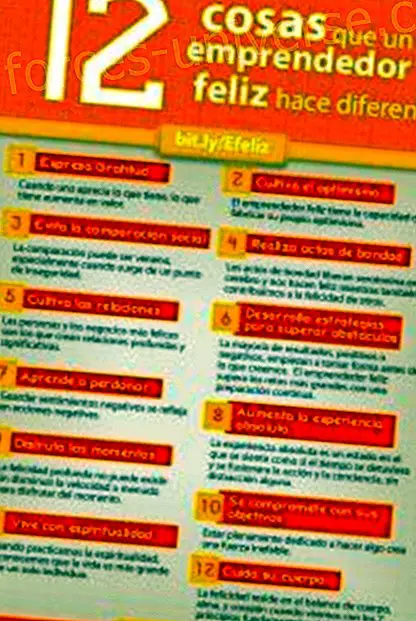 ENTREPRENEURS ATTITUDES:
ENTREPRENEURS ATTITUDES:
An entrepreneurial attitude is understood as the personal disposition to act proactively in the face of any situation in life. This attitude fosters the growth and permanent improvement of the life project.
Proactive people take responsibility for their own lives and see their existence as proof. The test makes it a general attitude towards the real. The test as an interrogation about itself, the test as an exercise twice, that is, as an exercise both in the real and on thinking. The work of the test is a work of neutralization of thought, desire and imagination, it is a work characteristic of Christian purity, different from pagan abstinence. The sense of responsibility is the first main expression of contact with the soul that influences the individual and goodwill is the second expression of the Self.
We know, then, through three phenomena, that man has a spirit or divine spirits residing in him: first, through personal experience, religious faith; second, by revelation, personal and racial; and thirdly, for the surprising display of such extraordinary and unnatural reactions to its material environment, entrepreneurship.
Through religious faith, the soul of man reveals himself and demonstrates the potential divinity of his emerging nature by the characteristic way in which he induces the personality to react to certain difficult intellectual and social situations of proof. Genuine spiritual faith, authentic moral conscience, is evident in the following entrepreneurial attitudes:
ü Promotes the progress of ethics and morals despite inherent and adverse instinctive tendencies.
ü Produces a sublime confidence in the goodness of God even in the face of bitter disenchantment and total defeat.
ü Generates deep courage and confidence despite natural adversity and physical calamity.
ü Exhibits an inexplicable poise and constant tranquility despite the presence of disconcerting diseases and even acute physical suffering.
ü Maintains a mysterious poise and a balance of personality against abuse and the most flagrant injustices.
ü Maintains a divine confidence in the final victory despite the cruelty of a seemingly blind fate and the apparent total indifference to the human well-being of natural forces.
ü Persists in the indestructible belief in God despite all the contrary demonstrations of logic and successfully resists all other intellectual sophisms.
ü He continues to display an infallible faith in the survival of the soul despite the deceptive teachings of false science and the persuasive delusions of a faulty philosophy.
ü Live and succeed despite the devastating weight of the complex and partial civilizations of modern times.
ü Contributes to the continued survival of altruism despite human selfishness, social antagonisms, industrial greed and political imbalances.
ü He unwaveringly adheres to the sublime belief in universal unity and divine guidance despite the disconcerting presence of evil and sin.
ü Continue to worship God despite everything and everything. He dares to declare "although I will kill myself, I will continue serving him."
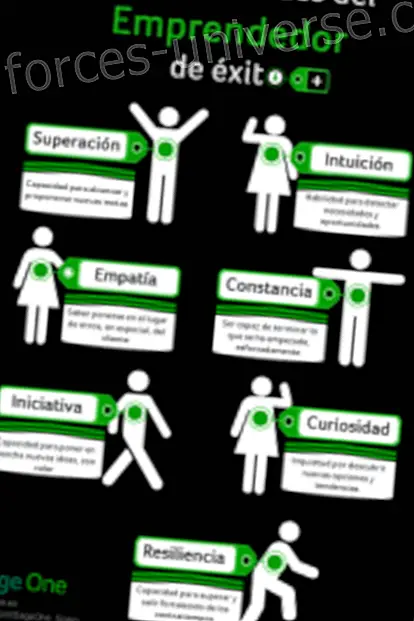 ENTERPRISE COMPETENCES:
ENTERPRISE COMPETENCES:
Competition means a know-how in context. Both the development of a competence and the development of virtue imply both theoretical knowledge and practical knowledge. Effort, zeal and training are what allow to reach practical knowledge.
The promotion of a culture of entrepreneurship requires the integration of intellectual, citizen and labor competencies in the daily action of the human being. Intellectual competencies provide support for the development of systemic and strategic thinking thanks to creativity, problem solving and decision making, citizen competencies promote the value of coexistence and respect for the law. Plato en Laws explains that in order to form a good citizen it is necessary to train both their physical value and their moderation. Labor competencies are translated into effective results that contribute to the achievement of the objectives of an organization, labor becomes organizational behavior. Behavioral competencies are defined as a set of personal characteristics that favor the performance of the functions of a position.
It would be useful to keep, what can be called a personal diary. It is about making a checklist and recording any lighting that comes to them, that sheds light on some problem and reveals the path that each or the group must follow. All intuition - corroborated by the reason that leads to knowledge and evokes the wisdom of the soul and registers the brain.
The purpose of the newspaper is to make available to the applicant an instrument that facilitates and accompanies him in the self-observation of his behavior in what concerns his entrepreneurial qualities.
Have self-confidence and be independent
Believe strongly in yourself and your skills.
Manifiesta confianza en su propia habilidad para realizar una tarea dif cil.
Ser persistente
Repite acciones o busca nuevos caminos para superar un obst culo.
Realiza un sacrificio personal o emprende un esfuerzo excepcional para terminar el trabajo.
Ser persuasivo y crear redes de apoyo
Utiliza estrategias deliberadas para influenciar o convencer a otros.
Utiliza contactos personales y laborales para cumplir sus propios objetivos.
Ser fiel a los acuerdos pactados
Se interesa por satisfacer las necesidades de otros.
Acepta plenamente la responsabilidad para resolver eventuales problemas en la finalización de una tarea.
Conseguir información
Busca sistemáticamente información.
Evalúa alternativas.
Buscar oportunidades y mostrar iniciativa
Percibe y reacciona frente a nuevas oportunidades que le ofrece el entorno
Aprovecha oportunidades poco usuales para obtener reconocimiento.
Planificar y hacer seguimiento sistemático.
Desarrolla y utiliza planes detallados para alcanzar sus objetivos.
Realiza seguimiento a sus metas y usa estrategias alternativas.
Fijar metas
Fija metas de corto plazo de manera clara y específica.
Fija objetivos de largo plazo de manera clara
Exigir eficiencia y calidad
Busca mantener o superar estándares existentes o mejorar trabajos anteriores
Se preocupa por hacer las cosas mejor o más rápido.
Correr riesgos
Corre riesgos moderados.
Prefiere situaciones que significan un riesgo moderado.
Al evaluar las competencias emprendedoras desde el punto de vista de un examen de conciencia estamos dando forma a un saber espiritual que implica cuatro condiciones: desplazamiento del sujeto, valorización de las cosas a partir de su realidad dentro del cosmos, posibilidad de que el sujeto se vea a sí mismo y trasfiguración del modo de ser del sujeto por efecto del saber. Así nos estaríamos preparando para el tercer y último llamado espiritual: “¡Conoce al Uno!”.
Cuadro comparativo de auxiliares, inteligencias, tecnologías y disciplinas del Yo.
AUXILIARES | INTELLIGENCES | TECNOLOGIAS | DISCIPLINES |
Valentía | Active | La Producción (técnica) | Systemic thinking |
Entendimiento | Armónica | La Significación (semiótica) | Shared vision |
Knowledge | Matemática | La Modelación (lógica) | Mental models |
Advice | Interpersonal | La Dominación (política) | Teamwork |
Wisdom | Intrapersonal | La Identificaci n ( tica) | Personal domain |
Emprendimiento: una tica para el siglo XXI

 TECHNICAL FUNDAMENTALS.
TECHNICAL FUNDAMENTALS.  REQUIREMENTS TO BE AN ENTREPRENEUR:
REQUIREMENTS TO BE AN ENTREPRENEUR:  ENTREPRENEURS ATTITUDES:
ENTREPRENEURS ATTITUDES:  ENTERPRISE COMPETENCES:
ENTERPRISE COMPETENCES: 
